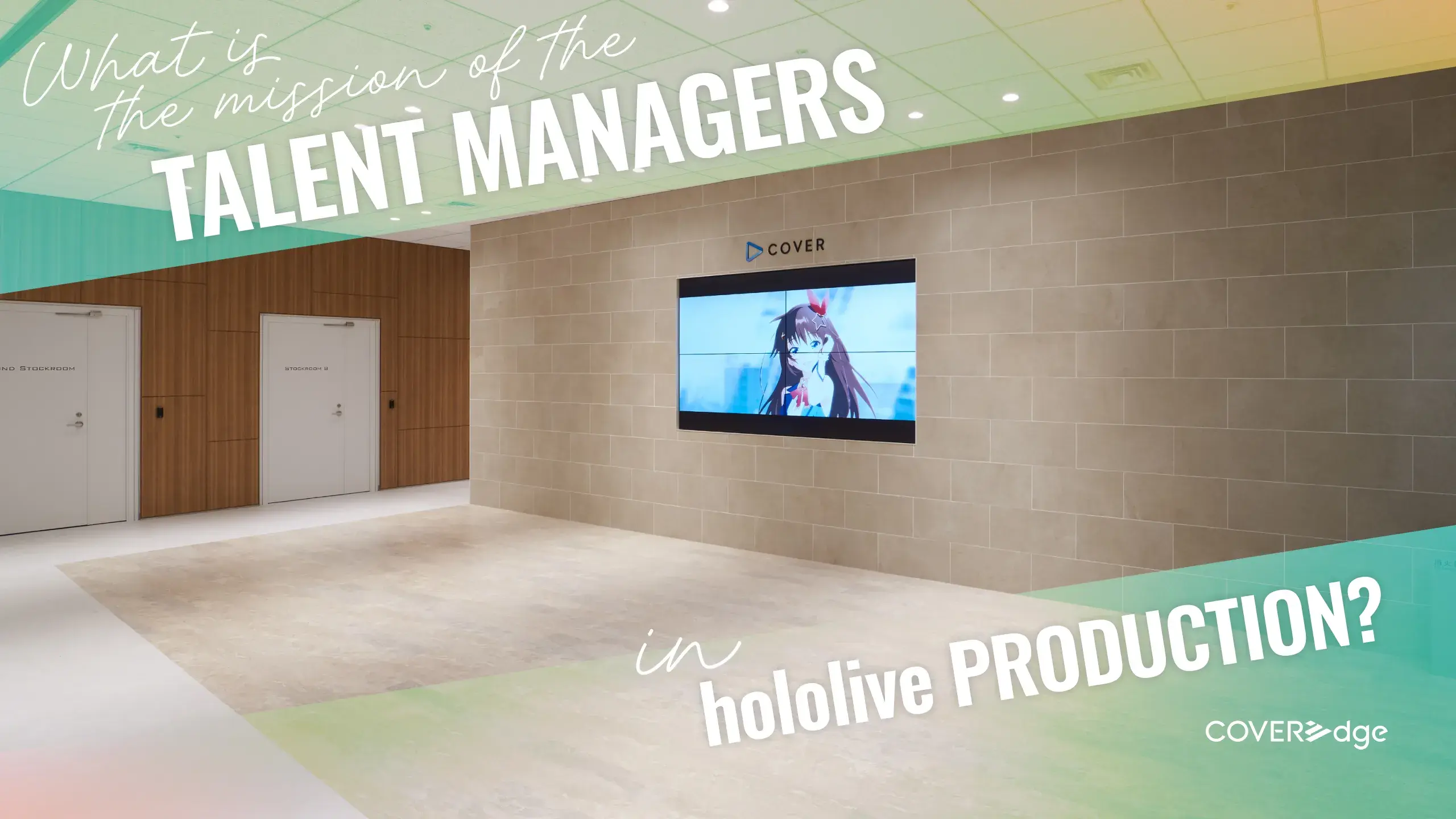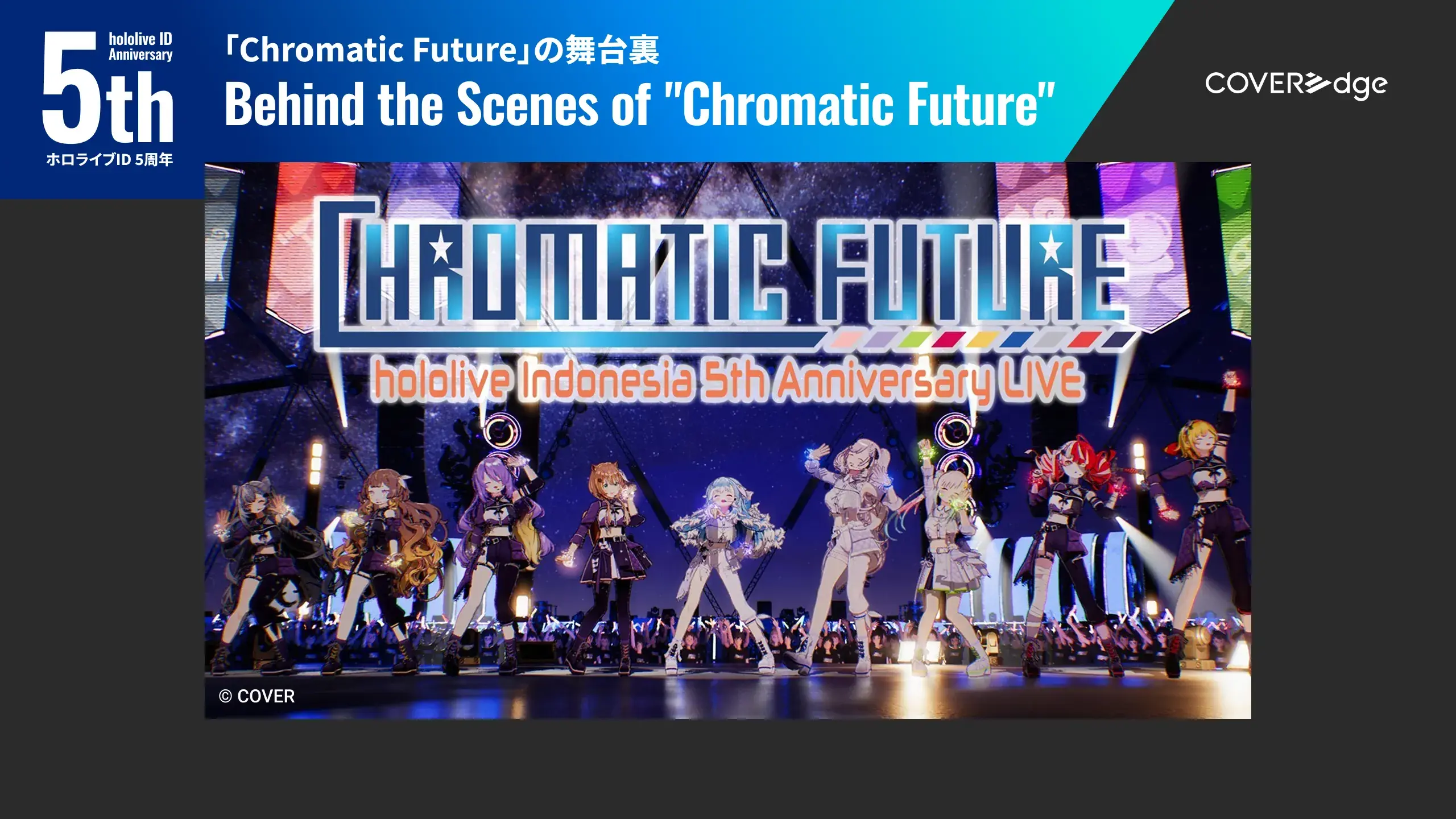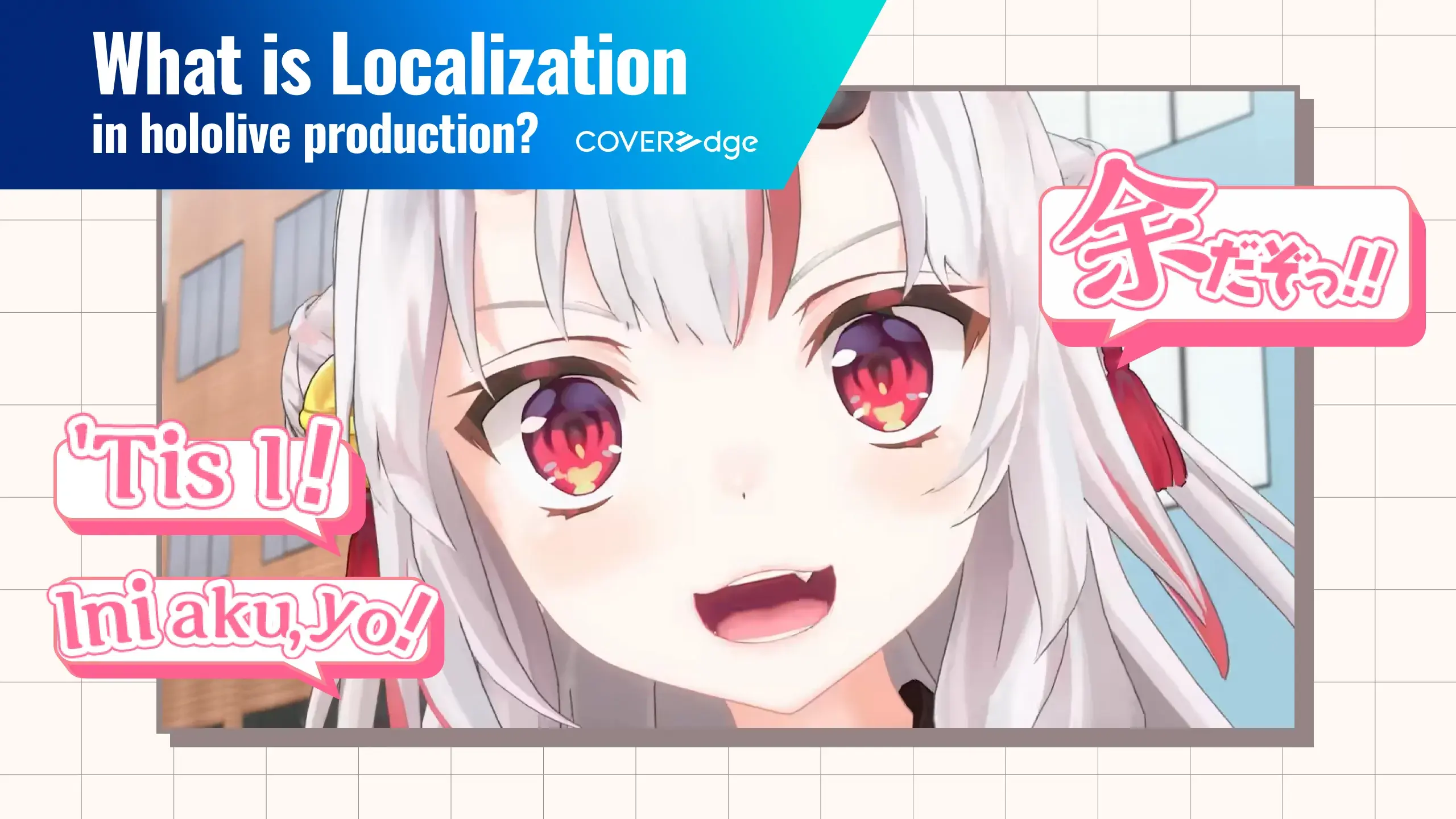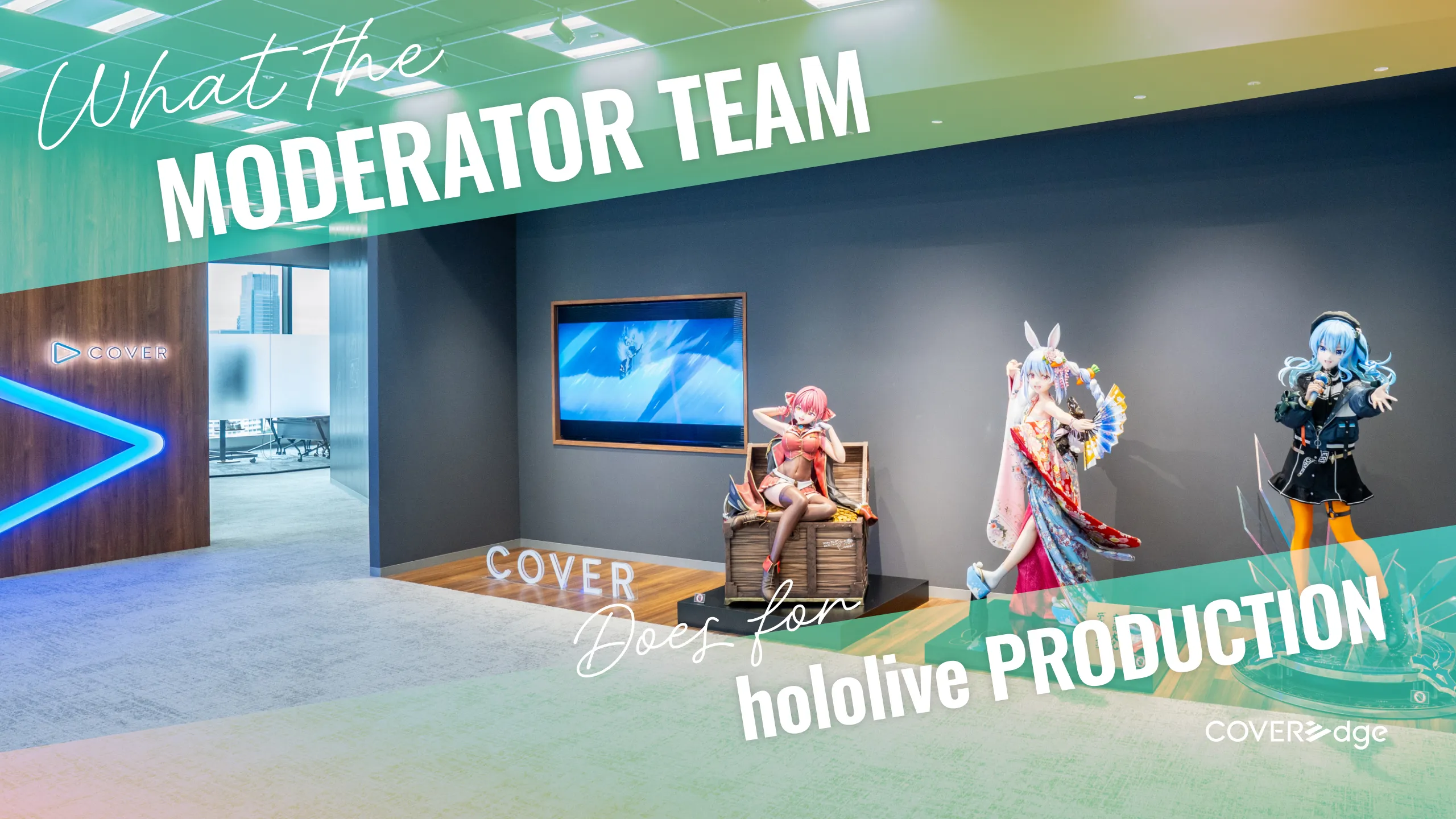
Hello to all COVER and hololive supporters!
For this interview, we’re excited to be joined by M, the head of our newly launched office, COVER USA. In this special feature, M shares insights into the company’s initial activities, goals for the future, the current VTuber trends in the North America, and the core principles driving our journey toward globalization!
In March 2024, COVER Corporation proudly announced that COVER USA would be established in April, with operations to begin in July, and thanks to the support from all of our listeners and fans, we’ve seen tremendous interest and excitement about hololive’s expansion into the North America.
As many of you may know, COVER has been dedicated to growing its overseas ventures. In September 2023, we shared an article highlighting our global ambitions.

Going beyond Japan: What does COVER’s International Business Department do?
This time, we are focusing on events outside Japan, vital to our overseas expansion, so we talked with R and Y from the International Event Team, who manage such events, and with M on the overall International Business Department. We hope this gives all of our readers an insight into the thoughts behind these overseas events, what initiatives the department is engaged in, and what the future holds.
The Official Launch of COVER USA! How Does It Differ from the Existing International Business Division?

―With COVER USA officially starting operations in July, thank you for taking the time to talk with us today!
Thank you for having me! I’m looking forward to talking with you.
―To start with, could you share with us a bit about your work at COVER and your current role?
I’m M, from South Korea and I joined COVER in August 2021. Before that, I was working as a product manager and publishing producerforgaming companies, at their offices in South Korea and Singapore.
COVER is the first Japanese company I’ve worked at. I joined as the leader of the international sales team, which was then part of the Sales Division, and at that time, various overseas teams such as the team managing talents from English speaking regions and the one focused on the Indonesian market, were spread across different business departments. This made it challenging to collaborate smoothly.
To address this, we consolidated all overseas teams into a single unit to improve coordination and streamline our operations and this led to the establishment of the overseas business department in 2022.
As the overseas team included members from South Korea, like myself, as well as many from Asia, Europe, and North America, communicating in English was often less hassle than using Japanese. Therefore, we in the overseas business department decided to primarily use English to communicate on the ground, and share any results and feedback directly with top management. I was then appointed head of the department.
Currently, I serve as the Sales and Licensing Director at COVER USA.
―What is the current structure of overseas business operations?
The Overseas Business Department previously covered a wide range of functions, including talent management, sales, PR, marketing, and events. As the department grew, our collaboration with internal shared service departments, such as studio teams that support our talents, also increased. However, it became increasingly difficult to have a clear view of what shared services and resources were available within the company.
As a result, we decided to recognize and refocus resources by function, similar to how we operated before, so the “Overseas Business Department” as a standalone department now no longer exists.
Even though we broadly refer to them as “international markets,” there are significant differences between, for instance, the Asian and Western markets. In the Asian region, Japanese culture is enjoyed by many, which makes expanding our business relatively easy, and minimal time differences allow for easier control from our headquarters in Japan. However, in Western markets, challenges such as time zone differences,language barriers, and different standards of business come into play.
This led to the decision to fully expand into the North America market by having a local base stateside, essential for addressing these challenges. I then took the opportunity to be a part of this endeavor and took up a position at COVER USA, wanting to contribute further to the growth of our international markets.
Business Development Strategy at COVER USA

―You are currently working as the Sales and Licensing Director at the North America branch office, but could you share a little more about your responsibilities and mission?
At COVER USA, we operate within a small but highly skilled team, and every member is involved in either sales or licensing operations. I oversee all of these activities as the Sales and Licensing Director.
Currently, at COVER USA, we are talking with the North America clients to better understand what the North America market and hololive fans in the region are looking for, as well as identifying any gaps between expectations angd reality. We are also exploring possible areas of expansion while advancing our sales and licensing activities. As the business grows, we anticipate that our responsibilities will expand as well to potentially include talent management in the North America in the future.
Also, on top of those two, another initiative we are looking into are more user experience friendly activation. Collaboration cafes and pop-up stores can be good examples. When I was working in Japan, collaboration cafes in Asia, as well as other events such as live viewing, where our fans can gather and enjoy the sense of community is something I put a lot of effort into. The geolocational nature of the North America is little different from Asian countries, but hopefully we can provide official events where our fans can gather and enjoy “being the part of community.”
―Could you explain more about sales and licensing operations?
Our activities are divided into two areas: sales and licensing.
The first of the two, sales, involves developing influencer marketing project opportunities that leverage talents’ influence. This may include campaigns such as those that promote clients’ products or services through content distribution.
Licensing, on the other hand, highlights one of the unique aspects of COVER Corporation: not only do we manage talents, but also work together with their brand. Licensing involves using this brand for collaborations, such as co-branded products or merchandise creation.
And as mentioned, there is also the “user experience-driven business” side of things that connects these two areas. A specific example is our collaboration cafes, where we sell merchandise and have themed menus inspired by our talents, supporting our fans and community activities.
―Why is the main focus on these two areas of business?
In the North America, VTubers are still relatively unknown to many, so to build up the brand value of COVER Corporation and hololive in this market, our priority is to focus on corporate initiatives. Collaborating with companies allows us to bring VTubers to a broader audience.
If you think of how hololive is well recognized not only by subculture fans, but also by mainstream entertainment in japan, such collaboration with mainstream brands was one of the contributing factors to expose our brand. Hopefully we can replicate that in the US.
For these reasons, COVER USA established its office in California. California is home to a significant number of game and entertainment companies that align closely with our business, with Japanese companies also having a considerable presence, providing an advantageous environment for business development. Moreover, viewer demographic data indicates that a substantial portion of hololive’s fanbase is concentrated on the West Coast, particularly in California. Many large-scale anime events are also held in California further reinforces its suitability as a base for our operations.
How Popular Is VTuber Culture in the North America?

―How are VTubers perceived in the North America?
To be honest, VTuber culture hasn’t gained as much traction here as it has in Japan. While many people are familiar with Japanese anime, it’s still necessary to start from the basics when explaining what value can be derived from collaborating with COVER and our brand, which shares a similar look and feel with anime. Without starting there, it can be challenging for people to fully understand its appeal.
However, in my view, I feel that the situation has gradually changed over the past one or two years. This is because there has been a noticeable increase in younger generations watching Japanese anime, and some companies have started recognizing this trend and incorporating it effectively into their marketing strategies. Therefore it has become less common to see people react with visible confusion or hesitation.
Of course, how these changes will translate into business growth or tangible results remains to be seen.
―It must be challenging to build something up from scratch on such a large scale. Have you faced any particular difficulties in this regard?
It is indeed challenging, but I believe there’s significant potential. During the COVID-19 pandemic, the number of people watching anime in the North America increased considerably. Personally, I spent three years in the U.S. during my middle and high school years, and I watched a lot of anime during that time, but it was still considered niche back then. Now, while anime is still considered a subculture, things have changed dramatically, with anime consumption much more widespread than it was before. Games with a Japanese aesthetic, like Genshin Impact, are also gaining popularity.
That said, anime consumption tends to peak during its streaming season, and once the season ends, it becomes challenging to meet the expectations of fans who want to continue supporting their favorite shows. Additionally, unlike countries like Korea or Taiwan, the vast size of the North America makes it difficult for fans to gather and engage in community activities as part of supporting their favorite talents.
On the other hand, the fans who do put in the effort to go to events are truly passionate and dedicated. We even had fans who were moved to tears at a recent Meet & Greet event. Also, this July, we collaborated with the tsukemen restaurant Tsujita to offer a special menu in partnership with our English-speaking VTuber group, hololive English -Myth-. There was constantly a line of fans outside waiting patiently to get in, so it was amazing to see how incredible their enthusiasm was.
When I was working in sales in the Overseas Business Department, the impact of collaborative content often surprised me, especially given the challenges fans face in going to events or collecting merchandise, and the fact that many fans in the North America may find it difficult to fully support their favorite VTubers or connect with fellow fans for various reasons. Through licensing and other initiatives, I want to support our fans and make sure they can continue to enjoy supporting talents with as few obstacles as possible.
What COVER Corporation should Focus on to Further Reach a Global Audience?
―What inspired you to join COVER Corporation?
I’ve always been a fan of Japanese anime. After spending nine years in the gaming industry, I reached a point where I wanted to try something different and deepen my expertise in a broader sense. This happened around the time of the COVID-19 pandemic, which was also when I started developing an interest in VTubers. What appealed to me was how similar they were to the Japanese anime I loved, but with the added excitement of expanding into various forms of content instead of being a one-and-done creation. That’s what ultimately led me to join the company.
―As a foreign national employee and someone playing a central role in the expansion of COVER Corporation’s business in the North America, I’d like to hear your thoughts on what you think is necessary for COVER Corporation to succeed in reaching a global market. Are there any challenges you’ve experienced that you’d like to share?
As a Japanese company, it’s natural that the primary language used when communicating is Japanese. However, from the perspective of a foreign national employee, this can sometimes be challenging. When hiring new employees, including foreign nationals, companies typically focus on their experience and skills, but if overseas employees are required to devote too much time and effort to improving their Japanese communication abilities and cannot fully utilize their already acquired skillsets, it defeats the purpose of hiring them in the first place.
To address this, I believe it’s essential to create an environment where everyone on the ground can communicate without issue while team leaders continue to coordinate closely with company decision-makers. This will be a critical step for COVER Corporation as it moves forward with its global initiatives.
―So improving employees’ English skills is key, then?
Actually, I take the opposite view. While it’s certainly helpful to have English proficiency, I don’t believe that improving language skills alone equates to globalization.
Fortunately, our company already has a diverse workforce, including people like me from South Korea, as well as colleagues from Asia, Europe, and the North America. These individuals not only have a deep understanding of their respective cultures and trends but are also highly skilled. I believe the key is to leverage their knowledge and expertise, regardless of language differences, to work toward a shared goal.
But above all else, fostering a culture of mutual respect – where everyone values the fact that we’re all collaborating toward a common objective – is what’s most important.
Expanding the VTuber Market in the North America
―As you work to expand the North America market, what kind of people would you like to work with?
Expanding our business hinges on how we build connections with companies in the areas we’re targeting. From that perspective, it’s important to have individuals who are well-versed in the industries we’re aiming at, but on top of that, having a strong understanding of North America culture, business practices, and how Americans think is also beneficial.
I believe this principle applies not only to the North America market but also to any country or region we look to enter.
―Could you share any goals you have for the future?
My role is to enhance our presence in the North America market. To achieve this, I aim to continue to pursue collaborations with major companies in the North America and work on influencer marketing initiatives, in the hope that this will contribute to elevating the value of our talents and brand. Meanwhile, hopefully we can add additional value by bridging and supporting activities from the game and streaming community in the North America with our talents. Lastly, as a fan myself, I would love to make the life of “being a hololive production fan” more fun in North America.






